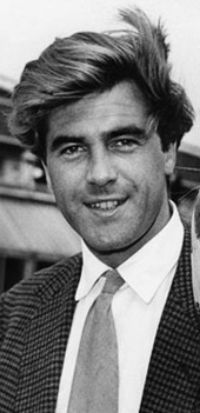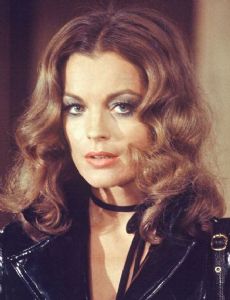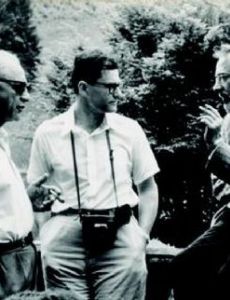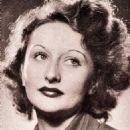Hildegard Knef Actress | Soundtrack | Writer - Date of Birth 28 December 1925, Ulm, Baden-Württemberg, Germany
Date of Death 1 February 2002, Berlin, Germany (lung infection)
Birth Name Hildegard Frieda Albertine Knef
Height 5' 6¼" (1.68 m)
Mini Bio (1) Hildegard Frieda Albertine Knef was born on December 28, 1925 in Ulm, Germany. In 1940, she began studying acting. Even before the fall of the Third Reich, she appeared in several films, but most of them were only released after the war. To avoid being raped by Soviet soldiers, she dressed like a young man and was sent to a camp for prisoners of war. She escaped and returned to war-shattered Berlin where she played her first parts on stage. The first German movie after World War II, Murderers Among Us (1946), made her a star. David O. Selznick invited her to Hollywood and offered her a contract - with two conditions: Hildegard Knef should change her name into Gilda Christian and should pretend to be Austrian instead of German. She refused both and returned to Germany. In 1951, she provoked one of the greatest scandals in German film history when she appeared naked on the screen in the movie Sunderin (1951). The Roman Catholic Church protested vehemently against that film, but Hildegard just commented: "I can't understand all that tumult - five years after Auschwitz!"
With the support of her first husband, the American Kurt Hirsch, she tried a second time to launch a Hollywood career, changed her family name from Knef to Neff (because Americans could not pronounce Knef), but the only worthwhile part she got was a supporting role in the Hemingway adaptation of The Snows of Kilimanjaro (1952). She became a leading lady in German, French and British films. Finally, America offered her another chance, this time on the stage. She achieved a kind of stardom as Ninotchka in the very popular Broadway play, "Silk Stockings". In 1963, she began a new career as a singer and surprised the audience with her typical, deep, smoky voice and the fact that many lyrics of her songs were written by herself. In 1970, she wrote the autobiographical bestseller "Der Geschenkte Gaul". She got sympathy from all over the world for her fight against cancer, which she defeated several times.
After the German reunification, Hildegarde Knef moved back to Berlin and died at age 76 of a lung infection on February 1, 2002.
- IMDb Mini Biography By: Yancey
Spouse (3)
editPaul von Schell (1977 - 1 February 2002) (her death)
David Cameron (1962 - 4 June 1976) (divorced) (1 child)
Kurt Hirsch (1947 - 1952) (divorced)
Trade Mark (1) Typical deep smoky voice
Trivia (17)
editKnown in the United States as Hildegard Neff, but she used her real name when performing back home in Germany.
Close personal friend of Marlene Dietrich, despite being in the legend's international shadow for much her career.
Was the cover girl for Modern Man Magazine in August 1956.
Sister-in-law of Catherine Schell.
Knef launched a career as a singer in the 1960s and wrote her bestselling autobiography "Der geschenkte Gaul - Bericht aus meinem Leben" ("The Gift Horse - Report from my life") in 1970.
Her nude scene as "Marina" in Sunderin (1951), the first in German filmmaking, drew the criticism of the Roman Catholic Church.
Ella Fitzgerald called her "the best singer without voice".
Became a naturalized citizen of the United States in 1950.
Gave birth to her daughter Christina (Tinta Knef) on 16 May 1968.
Hildegard trusted her clothing and gowns to one person who was based in New York. It was Irish-born Thomas Starr, grandfather of fashion designer Karen Starr-DelloIacono.
Mother-in-law of Peter Gardiner.
Her first American film was to be The Big Lift (1950) in which she would have co-starred with Montgomery Clift. Shortly before filming began, the producers got word that she had had an affair with a Nazi officer during World War II and fired her from the movie. Cornell Borchers replaced her. Later, she was lined up for the leads in Elia Kazan's Man on a Tightrope (1953) and in the film version of the musical Silk Stockings (1957) in which she had starred on Broadway. Gloria Grahame and Cyd Charisse were cast instead. When she refused to appear in Abandon Ship (1957) (Mai Zetterling took over her role), 20th Century Fox released her from her contract. She would never appear in an American film again.
Told her biographer Christian Schröder in 2000 that her favorite pictures were Murderers Among Us (1946), Film Without a Name (1948), Svengali (1954), Port of Desire (1958) and Everyone Dies Alone (1976). Her least favorite of her own movies was Escape from Sahara (1958) which was one of the biggest flops in post-war Germany and practically ended her film career.
According to her book, "The Gift Horse", she was the last person John Garfield spoke to before he died.
Provided the voice for Grandmother Willow on the German soundtrack version of Walt Disney's "Pocahontas".
When interviewed by Harald Schmidt in his talkshow, she revealed that Twentieth Century Fox had planned to campaign for the Best Supporting Actress Oscar for her role in 'Decision before dawn' but withdrew because of politics (she was German).
According to her memoirs "The Gift Horse", she found out that she had won the Best Actress award in Locarno for her role in "Film ohne Titel" by reading an article about her success in a newspaper - one year after the award was announced at the festival!.
http://www.imdb.com/name/nm0460651/bio?ref_=nm_ov_bio_sm
David Selznick invited her to Hollywood, but she refused to agree to the conditions of the contract which reportedly included changing her name to Gilda Christian and pretending to be Austrian rather than German. Years later, Knef's first husband, an American named Kurt Hirsch, encouraged her to try again for success in the U.S. She changed her name from Knef to Neff and achieved a measure of stardom on Broadway as “Ninotchka” in the Cole Porter musical, Silk Stockings.
Hildegarde Neff Actress - German actress Hildegarde Neff was enrolled right out of high school with UFA Studios' Training Program in preparation for a film career. After a brief period as an artist in an animation firm, she commenced her movie acting with 1945's Fahrt ins Gluck. One year later, Hildegarde attained fame beyond the boundaries of Germany for her role in Murderers Among Us (1946). An actress first and star second, Ms. Neff divided her time between films and stage work for the Deutsches Theatre. A potential 1948 contract with American producer David O. Selznick (prompted by the actress' appearance on a Life magazine cover) came to nothing, but the publicity attending her nude scene in the 1950 German film The Sinner won the actress a pact with 20th Century-Fox. In 1951, Hildegarde appeared in Decision Before Dawn, a Fox picture shot primarily in Germany. The studio changed the spelling of her name for marquee purposes - it had been "Knef" on her birth certificate and in her German appearances - and cast her in such "alluring European" roles as the depraved Countess Liz in Snows of Kilimanjaro (1952). Disturbed that she was perceived as a mere foreign "type" by American producers, Hildegarde returned to Europe in 1952. Her next significant success was back in the USA in the 1955 Broadway musical Silk Stockings, which made her a favorite in New York but failed to convince Hollywood that she was anything more than a pretty commodity. As "Hildegarde Knef" again, the actress spent the '60s performing in her nightclub act both in the US and the Continent, and acting occasionally in second-rate films; these were years blighted by poverty and the loss of fair-weather friends. She made a major dramatic comeback in 1970 with a European TV production of Jean Cocteau's La Voix Humaine, and the next year published her best-selling autobiography, The Gift Horse. Hildegarde Neff/Knef's second book came out in 1975: The Verdict was a no-nonsense account of her ongoing struggles with cancer.
Biography by Hal Erickson
http://www.allmovie.com/artist/hildegarde-neff-p52075
You can find people similar to Hildegard Knef by visiting our lists 20th-century German women singers and Burials at the Waldfriedhof Zehlendorf.
| Full name at birth | Hildegard Frieda Albertine Knef
|
||
| Claim to fame |
|
||
| Date of birth | 28 December 1925
|
||
| Place of birth | Ulm, Baden-Württemberg, Germany
|
||
| Date of death | 1 February 2002
|
||
| Age | 76 (age at death)
|
||
| Place of death | Berlin, Germany
|
||
| Occupation | Actress (65 credits) Soundtrack (19 credits) Writer (1 credit)
|
||
| Occupation category | |||
| Nationality |
PERSONAL DETAILS
| Height | 5' 6¼" (168 cm)
|
||
| Weight | 117 lbs (53 kg)
|
||
| Build | |||
| Hair color | |||
| Eye color | |||
| Gender | |||
| Ethnicity | |||
| Sexuality | |||
| Religion |
|
||
| Zodiac sign | |||
| Distinctive feature |
|
||
| Pets |
|
ADDITIONAL DETAILS
| High school |
|
||
| University |
|
||
| Talent agency |
|
||
| Political affiliation |
|
||
| Political party |
|
- He works for Jared Gold.
More...
- Albums (137) keyboard_arrow_right
- Songs (583) keyboard_arrow_right
- Trivia (1) keyboard_arrow_right
- Pictorials (4) keyboard_arrow_right
- Magazines (17) keyboard_arrow_right
- Photos (132) keyboard_arrow_right
- Lists (41) keyboard_arrow_right
- Filmography (192) keyboard_arrow_right
- Awards (5) keyboard_arrow_right
- Forum (2) keyboard_arrow_right
- Fans (5) keyboard_arrow_right
This page is the FamousFix profile for Hildegard Knef. Content on this page is contributed by editors who belong to our editorial community. We welcome your contributions... so please create an account if you would like to collaborate with other editor's in helping to shape this website.
On the Hildegard Knef page you will be able to add and update factual information, post media and connect this topic to other topics on the website. This website does skew towards famous actors, musicians, models and sports stars, however we would like to expand that to include many other interesting topics.








![Hildegard Knef - Screen Magazine Pictorial [Japan] (June 1953)](http://img3.bdbphotos.com/images/130x130/e/0/e0wkb0s7531ccw50.jpg?skj2io4l)
![Holiday for Henrietta - Ekran Magazine Pictorial [Poland] (20 July 1958)](http://img3.bdbphotos.com/images/130x130/h/k/hklsfop68omeposh.jpg?skj2io4l)
![Elsa Daniel - Billed Bladet Magazine Pictorial [Denmark] (10 July 1959)](http://img3.bdbphotos.com/images/130x130/x/q/xqbk448hmx7yh74q.jpg?skj2io4l)








